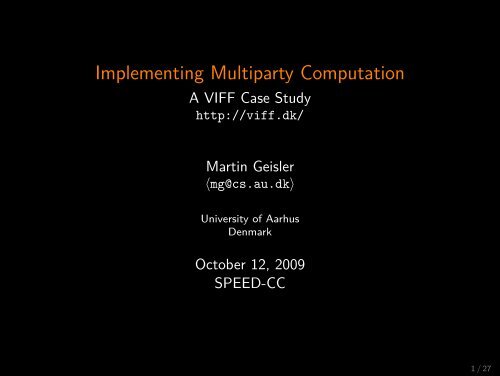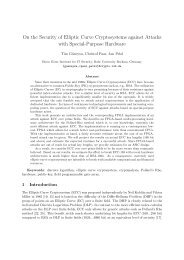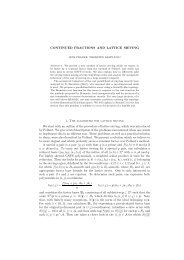Virtual Ideal Functionality Framework - Hyperelliptic org
Virtual Ideal Functionality Framework - Hyperelliptic org
Virtual Ideal Functionality Framework - Hyperelliptic org
Create successful ePaper yourself
Turn your PDF publications into a flip-book with our unique Google optimized e-Paper software.
Implementing Multiparty Computation<br />
A VIFF Case Study<br />
http://viff.dk/<br />
Martin Geisler<br />
〈mg@cs.au.dk〉<br />
University of Aarhus<br />
Denmark<br />
October 12, 2009<br />
SPEED-CC<br />
1 / 27
Outline<br />
Overview<br />
Multiparty Computation<br />
<strong>Virtual</strong> <strong>Ideal</strong> <strong>Functionality</strong> <strong>Framework</strong><br />
Design<br />
Network<br />
Environment<br />
Asynchronicity<br />
Program Counters<br />
Conclusion<br />
2 / 27
Outline<br />
Overview<br />
Multiparty Computation<br />
<strong>Virtual</strong> <strong>Ideal</strong> <strong>Functionality</strong> <strong>Framework</strong><br />
Design<br />
Network<br />
Environment<br />
Asynchronicity<br />
Program Counters<br />
Conclusion<br />
3 / 27
Quick Recap of Multiparty Computation<br />
P 1 P 2<br />
◮ n players<br />
◮ wish to jointly compute f<br />
◮ player P i has input x i<br />
◮ players learn<br />
y = f (x 1 , x 2 , . . . , x n )<br />
P 3<br />
4 / 27
Quick Recap of Multiparty Computation<br />
P 1 P 2<br />
◮ n players<br />
◮ wish to jointly compute f<br />
◮ player P i has input x i<br />
◮ players learn<br />
y = f (x 1 , x 2 , . . . , x n )<br />
P 3<br />
◮ up to t players are corrupt<br />
◮ must keep inputs private<br />
◮ must ensure correct output<br />
◮ players only learn y<br />
4 / 27
Requirements<br />
We need fast local operations:<br />
◮ fast cryptosystems<br />
◮ fast hash functions<br />
◮ and so on. . .<br />
5 / 27
Requirements<br />
We need fast local operations:<br />
◮ fast cryptosystems<br />
◮ fast hash functions<br />
◮ and so on. . .<br />
But we also need:<br />
◮ fast cryptographic protocols<br />
◮ flexible protocol description language<br />
◮ efficient usage of network resources<br />
5 / 27
VIFF Overview<br />
◮ VIFF: <strong>Virtual</strong> <strong>Ideal</strong> <strong>Functionality</strong> <strong>Framework</strong><br />
◮ Python library for MPC<br />
6 / 27
VIFF Overview<br />
◮ VIFF: <strong>Virtual</strong> <strong>Ideal</strong> <strong>Functionality</strong> <strong>Framework</strong><br />
◮ Python library for MPC<br />
◮ we wanted to write:<br />
i = int(sys . argv[1])<br />
(a, b, c) = shamir_share(i)<br />
x = a ∗ b + c<br />
print open(x)<br />
# read commandline argument<br />
# Shamir secret share input<br />
# secure multiparty computation<br />
# broadcast and recombine<br />
(we almost got there)<br />
6 / 27
VIFF Overview<br />
◮ VIFF: <strong>Virtual</strong> <strong>Ideal</strong> <strong>Functionality</strong> <strong>Framework</strong><br />
◮ Python library for MPC<br />
◮ we wanted to write:<br />
i = int(sys . argv[1])<br />
(a, b, c) = shamir_share(i)<br />
x = a ∗ b + c<br />
print open(x)<br />
# read commandline argument<br />
# Shamir secret share input<br />
# secure multiparty computation<br />
# broadcast and recombine<br />
(we almost got there)<br />
◮ we also wanted this code to execute in one round:<br />
x = a ∗ b<br />
y = b ∗ c<br />
z = c ∗ a<br />
◮ we wanted to do MPC over real networks, i.e., the Internet<br />
6 / 27
Applications<br />
We have implemented a number of applications in VIFF:<br />
◮ Distributed AES<br />
◮ Distributed RSA<br />
◮ Double Auction<br />
◮ Voting<br />
◮ Poker<br />
7 / 27
Related Projects<br />
SIMAP — http://simap.dk/<br />
◮ general multiparty computations<br />
◮ Java implementation<br />
◮ some work done on a domain specific language<br />
8 / 27
Related Projects<br />
SIMAP — http://simap.dk/<br />
◮ general multiparty computations<br />
◮ Java implementation<br />
◮ some work done on a domain specific language<br />
FairPlay — http://fairplayproject.net/<br />
◮ Yao-garbled circuits for 2 or more parties<br />
◮ Java implementation<br />
◮ own language for MPC programs<br />
8 / 27
Related Projects<br />
SIMAP — http://simap.dk/<br />
◮ general multiparty computations<br />
◮ Java implementation<br />
◮ some work done on a domain specific language<br />
FairPlay — http://fairplayproject.net/<br />
◮ Yao-garbled circuits for 2 or more parties<br />
◮ Java implementation<br />
◮ own language for MPC programs<br />
Sharemind — http://sharemind.cs.ut.ee/<br />
◮ computation over the ring Z 2 32<br />
◮ C++ implementation<br />
◮ scalable to very large data sets<br />
◮ own MPC assembler language and compiler<br />
8 / 27
Outline<br />
Overview<br />
Multiparty Computation<br />
<strong>Virtual</strong> <strong>Ideal</strong> <strong>Functionality</strong> <strong>Framework</strong><br />
Design<br />
Network<br />
Environment<br />
Asynchronicity<br />
Program Counters<br />
Conclusion<br />
9 / 27
Asynchronous vs. Synchronous Network<br />
VIFF assumes an asynchronous network:<br />
◮ real-world networks are asynchronous<br />
◮ it is the most flexible choice<br />
10 / 27
Asynchronous vs. Synchronous Network<br />
VIFF assumes an asynchronous network:<br />
◮ real-world networks are asynchronous<br />
◮ it is the most flexible choice<br />
Time<br />
multiply<br />
multiply<br />
share share share share<br />
◮ all rounds equally fast<br />
◮ optimal execution<br />
10 / 27
Asynchronous vs. Synchronous Network<br />
VIFF assumes an asynchronous network:<br />
◮ real-world networks are asynchronous<br />
◮ it is the most flexible choice<br />
Time<br />
multiply<br />
multiply<br />
share share share share<br />
◮ all rounds equally fast<br />
◮ optimal execution<br />
Time<br />
multiply<br />
multiply<br />
share share share share<br />
◮ processing stalls<br />
◮ wasted time!<br />
10 / 27
Transport Protocol<br />
We currently use SSL over TCP:<br />
◮ gives reliable, authenticated point-to-point channels<br />
◮ litterature generally wants exactly this<br />
11 / 27
Transport Protocol<br />
We currently use SSL over TCP:<br />
◮ gives reliable, authenticated point-to-point channels<br />
◮ litterature generally wants exactly this<br />
UDP would be an interesting alternative:<br />
◮ discrete packets — send one share per packet<br />
◮ we do not care about reordering<br />
◮ most protocols can handle some dropped packets!<br />
11 / 27
Network Architecture<br />
We use a peer-to-peer architecture:<br />
◮ parties are symmetric<br />
◮ very general architecture<br />
12 / 27
Network Architecture<br />
We use a peer-to-peer architecture:<br />
◮ parties are symmetric<br />
◮ very general architecture<br />
SIMAP used a central coordinator:<br />
◮ forwards packets only<br />
◮ makes NAT-traversal simple<br />
◮ a potential bottle-neck<br />
12 / 27
Programming Language<br />
VIFF is written in Python:<br />
◮ flexible language, well suited for rapid prototyping<br />
◮ Twisted library for asynchronous network communication<br />
13 / 27
Programming Language<br />
VIFF is written in Python:<br />
◮ flexible language, well suited for rapid prototyping<br />
◮ Twisted library for asynchronous network communication<br />
◮ anonymous functions:<br />
share_x.addCallback(lambda x: x ∗ x)<br />
13 / 27
Programming Language<br />
VIFF is written in Python:<br />
◮ flexible language, well suited for rapid prototyping<br />
◮ Twisted library for asynchronous network communication<br />
◮ anonymous functions:<br />
share_x.addCallback(lambda x: x ∗ x)<br />
◮ operator overloading:<br />
a.add(b).sub(a.mul(b).mul(2)) a + b − 2 ∗ a ∗ b<br />
13 / 27
Programming Language<br />
VIFF is written in Python:<br />
◮ flexible language, well suited for rapid prototyping<br />
◮ Twisted library for asynchronous network communication<br />
◮ anonymous functions:<br />
share_x.addCallback(lambda x: x ∗ x)<br />
◮ operator overloading:<br />
a.add(b).sub(a.mul(b).mul(2)) a + b − 2 ∗ a ∗ b<br />
◮ absolutely everything is interpreted<br />
◮ lack of static types enables stupid mistakes<br />
13 / 27
Programming Environment<br />
VIFF provides the a framework in the form of a library:<br />
◮ makes “VIFF programs” regular Python programs<br />
◮ provides full access to Python standard library<br />
14 / 27
Programming Environment<br />
VIFF provides the a framework in the form of a library:<br />
◮ makes “VIFF programs” regular Python programs<br />
◮ provides full access to Python standard library<br />
◮ however, we cannot use control structures directly:<br />
if rt.open(a < b and b < c):<br />
print "Wow, monotone!"<br />
Must rewrite as:<br />
def check_monotone(result):<br />
if result:<br />
print "Wow, monotone!"<br />
x = rt.open(a < b and b < c)<br />
x.addCallback(check_monotone)<br />
◮ long-term solution: put a DSL on top of VIFF<br />
14 / 27
Programming Paradigm<br />
Asynchronous communication via callbacks:<br />
◮ “don’t call us, we’ll call you”<br />
◮ uses a network library called Twisted<br />
15 / 27
Programming Paradigm<br />
Asynchronous communication via callbacks:<br />
◮ “don’t call us, we’ll call you”<br />
◮ uses a network library called Twisted<br />
◮ Twisted’s fundamental abstraction is the Deferred:<br />
def output(x): print x<br />
d = Deferred()<br />
d.addCallback(lambda x: x + 1)<br />
d.addCallback(lambda x: x ∗ 2)<br />
d.addCallback(output)<br />
d.callback(10)<br />
d<br />
10<br />
lambda x: x + 1<br />
11<br />
lambda x: x ∗ 2<br />
22<br />
output<br />
None<br />
15 / 27
Programming Paradigm<br />
Asynchronous communication via callbacks:<br />
◮ “don’t call us, we’ll call you”<br />
◮ uses a network library called Twisted<br />
◮ Twisted’s fundamental abstraction is the Deferred:<br />
def output(x): print x<br />
d = Deferred()<br />
d.addCallback(lambda x: x + 1)<br />
d.addCallback(lambda x: x ∗ 2)<br />
d.addCallback(output)<br />
d.callback(10)<br />
d<br />
10<br />
lambda x: x + 1<br />
11<br />
lambda x: x ∗ 2<br />
22<br />
output<br />
None<br />
◮ this can lead to an unnatural way of programming<br />
◮ completely single-threaded — no blocking the event loop!<br />
15 / 27
More on Deferreds<br />
We use Deferreds heavily:<br />
◮ subclass Share provides operator overloading:<br />
x = a ∗ b + c ∗ 10<br />
16 / 27
More on Deferreds<br />
We use Deferreds heavily:<br />
◮ subclass Share provides operator overloading:<br />
x = a ∗ b + c ∗ 10<br />
◮ Share objects are created and combined:<br />
x<br />
+<br />
*<br />
*<br />
a<br />
b<br />
c 10<br />
16 / 27
More on Deferreds<br />
We use Deferreds heavily:<br />
◮ subclass Share provides operator overloading:<br />
x = a ∗ b + c ∗ 10<br />
◮ Share objects are created and combined:<br />
x<br />
+<br />
*<br />
*<br />
a<br />
b<br />
c 10<br />
network trafic<br />
16 / 27
Dangers of Deferreds<br />
Deferreds are not free:<br />
◮ a single, empty Deferred is about 200 bytes<br />
◮ adding a callback costs at least 300 bytes more<br />
17 / 27
Dangers of Deferreds<br />
Deferreds are not free:<br />
◮ a single, empty Deferred is about 200 bytes<br />
◮ adding a callback costs at least 300 bytes more<br />
◮ it is easy to allocate lots of Deferreds:<br />
for i in range(10000):<br />
x = x ∗ x<br />
◮ all 10,000 multiplications are scheduled immediately:<br />
x * * . . . * x<br />
17 / 27
What About Threads<br />
Threads are the main alternative to callbacks:<br />
◮ can use multiple cores!<br />
◮ normal program flow, you can block when you want<br />
18 / 27
What About Threads<br />
Threads are the main alternative to callbacks:<br />
◮ can use multiple cores!<br />
◮ normal program flow, you can block when you want<br />
◮ thread-switches supposedly have some overhead<br />
◮ must synchronize threads (and avoid dead-locks. . . )<br />
◮ need a way to specify future tasks (callbacks. . . )<br />
18 / 27
Pipelining<br />
Network delay kills throughput unless we run things in parallel:<br />
◮ like a CPU, we pipeline many operations in parallel<br />
19 / 27
Pipelining<br />
Network delay kills throughput unless we run things in parallel:<br />
◮ like a CPU, we pipeline many operations in parallel<br />
◮ can potentially remove idle time:<br />
A B A B<br />
19 / 27
Pipelining<br />
Network delay kills throughput unless we run things in parallel:<br />
◮ like a CPU, we pipeline many operations in parallel<br />
◮ can potentially remove idle time:<br />
A B A B<br />
19 / 27
Pipelining<br />
Network delay kills throughput unless we run things in parallel:<br />
◮ like a CPU, we pipeline many operations in parallel<br />
◮ can potentially remove idle time:<br />
A B A B<br />
19 / 27
Pipelining<br />
Network delay kills throughput unless we run things in parallel:<br />
◮ like a CPU, we pipeline many operations in parallel<br />
◮ can potentially remove idle time:<br />
A B A B<br />
19 / 27
Pipelining<br />
Network delay kills throughput unless we run things in parallel:<br />
◮ like a CPU, we pipeline many operations in parallel<br />
◮ can potentially remove idle time:<br />
A<br />
B<br />
A<br />
B<br />
Idle<br />
Idle<br />
Idle<br />
Idle<br />
19 / 27
Automatic pipelining<br />
VIFF will automatically pipeline everything:<br />
◮ network traffic begins upon return to event loop<br />
◮ no notion of rounds<br />
◮ fits naturally with asynchronous execution<br />
20 / 27
Why We Must Keep Track of Things<br />
Consider this very high-level code for multiplication:<br />
def mul(share_a, share_b):<br />
result = gather_shares([share_a, share_b])<br />
result.addCallback(finish_mul)<br />
return result<br />
21 / 27
Why We Must Keep Track of Things<br />
Consider this very high-level code for multiplication:<br />
def mul(share_a, share_b):<br />
result = gather_shares([share_a, share_b])<br />
result.addCallback(finish_mul)<br />
return result<br />
It is used twice like this:<br />
x = a ∗ b<br />
y = c ∗ d<br />
21 / 27
Why We Must Keep Track of Things<br />
Consider this very high-level code for multiplication:<br />
def mul(share_a, share_b):<br />
result = gather_shares([share_a, share_b])<br />
result.addCallback(finish_mul)<br />
return result<br />
It is used twice like this:<br />
x = a ∗ b<br />
y = c ∗ d<br />
We now have a problem:<br />
◮ finish_mul is executed when a and b arrives<br />
◮ finish_mul is executed when c and d arrives<br />
◮ other players cannot know which pair arrives first!<br />
21 / 27
Program Counters<br />
VIFF use program counters to track operations:<br />
[0]<br />
mul<br />
[1]<br />
mul<br />
[2]<br />
[1, 0]<br />
finish_mul<br />
[2, 0]<br />
finish_mul<br />
22 / 27
Program Counter Properties<br />
◮ assignment depends on program structure<br />
◮ ensures deterministic assignments<br />
◮ unique labels for each operation<br />
23 / 27
Preprocessing<br />
Many protocols can be divided into two phases:<br />
◮ an off-line phase which is independent of actual input<br />
◮ an on-line phase which do depend on the input<br />
24 / 27
Preprocessing<br />
Many protocols can be divided into two phases:<br />
◮ an off-line phase which is independent of actual input<br />
◮ an on-line phase which do depend on the input<br />
A good example is an actively secure multiplication:<br />
◮ generate a random triple ([a], [b], [ab]) off-line<br />
◮ use it to multiply [x] and [y]:<br />
d = open ( [x] − [a] )<br />
e = open ( [y] − [b] )<br />
[xy] = de + d[y] + e[x] + [ab]<br />
But how to implement this<br />
24 / 27
Program Counters Strikes Again!<br />
We have an unique label for each operation:<br />
◮ run program without any preprocessed data<br />
◮ record program counters for missing data<br />
◮ start next run with a preprocessing phase<br />
25 / 27
Program Counters Strikes Again!<br />
We have an unique label for each operation:<br />
◮ run program without any preprocessed data<br />
◮ record program counters for missing data<br />
◮ start next run with a preprocessing phase<br />
Will the program always use the same program counters<br />
◮ yes! — otherwise it would leak information on the inputs<br />
25 / 27
Outline<br />
Overview<br />
Multiparty Computation<br />
<strong>Virtual</strong> <strong>Ideal</strong> <strong>Functionality</strong> <strong>Framework</strong><br />
Design<br />
Network<br />
Environment<br />
Asynchronicity<br />
Program Counters<br />
Conclusion<br />
26 / 27
Conclusion<br />
Experiences with VIFF:<br />
◮ asynchronous design works well<br />
◮ flexible design pays off<br />
27 / 27
Conclusion<br />
Experiences with VIFF:<br />
◮ asynchronous design works well<br />
◮ flexible design pays off<br />
Thank you!<br />
27 / 27






